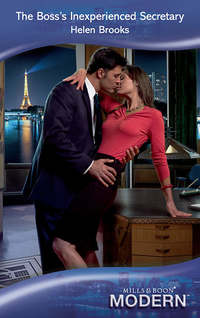
Полная версия
In the Italian's Sights


She felt his fingers release the clip holding her hair, and as it fell about her shoulders Cherry jerked away.
‘Don’t,’ she said sharply, holding out her hand for the fastener. ‘It’s too hot to wear it down today.’
‘And is this the only reason you hide such beauty from me?’ he said, ignoring her outstretched fingers.
She stared at him, wondering if he was making fun of her. Her hair was ordinary. She was ordinary.
‘My hair is nothing special.’ She fixed him with her most severe look. ‘And how I choose to wear it has absolutely nothing to do with you.’
He smiled faintly, which Cherry found incredibly irritating. ‘Do not deny once again there is not a man behind your sojourn in my country,’ he said with unforgivable audacity. ‘A man who is stupid enough to let you slip through his fingers does not deserve you anyway.’
About the Author
HELEN BROOKS lives in Northamptonshire, and is married with three children and three beautiful grandchildren. As she is a committed Christian, busy housewife, mother and grandma, her spare time is at a premium, but her hobbies include reading, swimming and gardening, and walks with her husband and their two Irish terriers. Her long-cherished aspiration to write became a reality when she put pen to paper on reaching the age of forty and sent the result off to Mills & Boon.
Recent titles by the same author:
THE BEAUTIFUL WIDOW
SNOWBOUND SEDUCTION
SWEET SURRENDER WITH THE MILLIONAIRE
THE MILLIONAIRE’S CHRISTMAS WIFE
THE BOSS’S INEXPERIENCED SECRETARY
Did you know these are also available as eBooks? Visit www.millsandboon.co.uk
In the
Italian’s Sights
Helen Brooks

CHAPTER ONE
HOW had she got herself into this position? It was ridiculous, stupid—she wouldn’t let herself think dangerous—and not at all like her. She was sensible, methodical—she didn’t do the rushing off in an impetuous tantrum thing. She never had. Mind you, the impetuous tantrum depiction was her mother’s definition of her actions, not hers.
Cherry Gibbs shielded her eyes as she stared up and down the narrow country road bordered by drystone walls with miles of olive groves stretching away as far as the eye could see in either direction. Then her gaze returned to the hire car, sitting stolidly in the warm May sun, the driver’s door hanging open. For the umpteenth time in the last hour she climbed back in to the vehicle and tried the engine. Nothing. Not a murmur.
‘Don’t do this to me.’ She pushed back a strand of silky brown hair from her hot face. ‘Not here, not now. Please, please, please start this time.’
Holding her breath, she turned the key in the ignition. As dead as a dodo. The car clearly wasn’t going to go anywhere. OK, what to do now? She couldn’t sit here all day, hoping someone might come along. It wouldn’t have been a problem if she had kept to one of the motor ways or main roads, but after leaving the town where she’d stayed overnight she’d made the decision to get off the beaten track for a while. Italy, she’d found, was different from England in many respects—most of them good. But not with regard to driving.
In an unofficial sense, and to all intents and purposes, there were no rules of the road. Driving in the towns was a nerve-racking experience, and she’d found she needed her wits about her every second she was behind the wheel. Locals tended to pull out suddenly and without warning, overtake at hairpin bends, turn left or right on red lights if they saw an opportunity, keep bumper to bumper in their lane rather than give way to other drivers, and blast their horns incessantly if she sat at a green light for a split second.
She’d been in the region of Puglia, the southern ‘heel’ of Italy, for five days, and was in danger of developing a permanent stress-related headache. Somewhat ironic as she’d fled the UK to escape just that very thing. Hence the decision to give herself a break from the towns. Not that she hadn’t enjoyed the last few days overall.
Since she’d arrived at the airport in Brindisi, and picked up the hire car she’d arranged to have waiting, she had explored the southern tip of Puglia, taking in Lecce and the Salentine Peninsula—which was undeniably beautiful. The compact, meandering Old Town of Lecce was a paean to Baroque artistry, every church façade positively dripping with stone representations of foliage, animal life and religious imagery, and when she had followed the coast road to the very tip of the land’s end she’d felt as though she was on the edge of the world as she’d looked out from Santa Maria di Leuca across to the distant mountains of Albania. That had been a good day. She hadn’t thought of Angela and Liam more than a dozen times.
After shutting her eyes tightly for a moment, she opened them and climbed out of the car. No self-pity. She gazed up into the brilliant blue sky. She had done enough crying over the last months to last a lifetime. This trip was all part of beginning her life anew—and that included no dwelling over the past or grieving for what she’d lost.
Reaching through the open passenger window she fetched out the map she’d bought at the airport and pored over it. She had left the little pensioni on the outskirts of Lecce after a late breakfast of cappuccino and sweet pastries, driving up the coast for some thirty-five miles or so before turning inland. She had stopped for diesel for the little Fiat in a town called Alberobello, famous for its gathering of quirky trulli houses—small limestone buildings with squat whitewashed walls and domed stone roofs. They were truly magical little houses, and she had seen others scattered here and there in the region. She had spent some time looking at them before buying a bag of figs and a panetto—a cake made with raisins, almonds, figs and wine—from a local market.
At least she wouldn’t starve. She glanced at the purchases on the back seat of the car. It was beginning to feel like a long time since breakfast.
She’d left Alberobello some twenty minutes ago, and almost immediately had found herself in the heart of a traditional southern Italian lifestyle unchanged for decades, its landscape dotted with pine, almond and prickly pear trees and endless olive groves and vineyards. Alberobello had begun to batten down the hatches and shut up shop for the siesta as she had driven away, and she knew within minutes the place would resemble a ghost town, with empty streets and echoing alleyways bereft of any human activity. She would have been hard put to it to find anyone to help her in the town, much less out here in the middle of nowhere. She’d been following country roads and dirt lanes for a while and had no clear idea where the nearest village was.
Tossing the map back through the window, she sighed deeply. She had her mobile phone but who the heck could she call to get her out of this fix? No one at home could help, and there were no foreign embassies in Puglia—although she had taken the precaution before leaving the UK to get the number of the nearest embassy in Rome and the number of the British Honorary Consul in Bari. Neither of which were any use now, because she didn’t have a clue where she was. Southern Italy had a justified reputation for petty crime and car theft in the towns and cities; bag-snatching was a possibility and she’d been warned not to leave the car in a dark or secluded place by the hire company and to keep any valuables out of sight. The very nice Italian man who’d delivered the car had also advised her to avoid walking alone late at night. Thieves could spot a tourist a mile away.
Still, she wasn’t in a city or town here, was she? The thought was of little comfort. She had passed the odd tiny village and farmhouse, even the occasional trulli house since leaving Alberobello, but exactly how far she would have to walk before she reached the nearest habitation she wasn’t sure—because she hadn’t been concentrating on that. And she would have to take all her belongings with her. She winced at the thought. Her suitcase weighed a ton and even her shoulder bag was heavy. And it would mean leaving the car unattended. Think of all the red tape and paperwork if it got stolen.
Cherry sighed again. The olive groves either side of the road were picturesque, the warm balmy air was scented with summer, and the only sound was the lazy humming and buzzing of insects and the odd bird call; normally she would have drunk in such serenity.
Stupid car. She glared at it. But she wasn’t going to panic. She would eat her lunch—it would be one less thing to carry, after all—and then start walking back whence she’d come. It was the only thing she could do. It might be hours, days, before someone came down this road, for all she knew, and the thought of staying with the car and it getting dark was a bit scary. She’d seen too many horror movies that didn’t end well to do that. She smiled wryly at herself.
Cherry was sitting perched on top of the drystone wall eating the cake when she heard the sound of a vehicle. Narrowing her eyes, she peered into the distance, her heart pounding. She saw a cloud of dust first, on the road in front of her. If it was one of the local farmers he was going to be thrilled to bits with the roadblock she’d inadvertently caused. Nevertheless, a middle-aged fatherly farmer would be preferable to one of the many Don Juans she’d encountered since being here, who clearly considered a young English girl on her own fair game. It didn’t help that she looked so much younger than her twenty-five years either. Small at five-foot-four, and naturally slender, she was resigned to being taken for seventeen or eighteen. Liam had often pulled her leg about it, saying he was aware everyone would think he was cradle-snatching when she was constantly asked for her ID at nightclubs.
She could see a car now, and all thoughts of Liam went out of her head as she surveyed the midnight-blue Ferrari nosing its way towards her. Hell. Definitely one of the local Lotharios. And no doubt one who’d think he was doing her a great honour by brightening up her sad existence and offering to sleep with her—like the one a couple of days ago, who’d asked her if she’d like some real Italian loooove. She’d actually laughed at the way he’d drawn out the last word, before refusing his generous offer as politely as she could. He’d taken the rebuff with the lazy, philosophical good humour most young Italian males exhibited towards the opposite sex, joining his friends after blowing her a theatrical kiss. Not for the first time since she had been in Italy, she’d thought the outrageous flirting was just a game. Albeit an ever hopeful one.
Cherry clambered down from the wall, brushing crumbs of cake from her T-shirt. She had reached the Fiat by the time the approaching car drew to a halt. The tinted windows made it difficult to see the occupant, and as the driver’s door opened she braced herself, trying to gather her composure. It was one thing dealing with over-confident and amorous males in the safety of crowded streets or market places—quite another on a lonely stretch of road without a soul in sight. For a split second all the stories she’d ever heard about women tourists abroad getting raped or murdered were as one in her mind.
The man who uncoiled himself with leisurely ease from the Ferrari was no youth. Cherry had a quick impression of height—at least six foot—breadth—his shoulders were broad and strong—and a handsome dark face which had lines of experience carved into it, before he drawled something in Italian. She didn’t understand any of it beyond the signorina at the end.
‘I’m sorry, I don’t speak Italian,’ she said quickly.
She thought he sighed before he said, ‘You are English?’
It was said with an air of resignation. He didn’t actually add, Another stupid tourist, but he might as well have. Cherry felt her hackles rising and her nod was curt.
‘So.’ He surveyed her through dark sunglasses. ‘There is a problem, signorina?’
Yes—and she had the feeling she was looking at it. With a calm she was far from feeling, Cherry gave a cool smile. ‘I’m afraid my car has broken down.’
‘And your destination?’ he asked smoothly.
‘I don’t know.’ That sounded ridiculous, and she hastily added, ‘I was just exploring. I wasn’t making for anywhere specific.’ That didn’t sound too great either.
‘Where are you staying?’
This time she kept her voice firm and precise when she said, ‘I’ve been staying in Lecce, but I decided to come up the coast for a while. To do a bit of sight seeing,’ she added defiantly.
‘This is not a coast road, signorina.’
Sarcastic swine. ‘I’m aware of that,’ she said crisply. ‘Someone told me about the medieval castles of Puglia, and in particular the Castel del Monte. I—I was going in that direction, but I wanted to see a bit of the country side.’
‘I see.’ The two words told her exactly what he thought of her decision to turn inland. ‘And now you are blocking my road.’ He moved slightly and every nerve in her tensed.
‘Your road?’ she asked warily.
‘Si,’ he said with silky gentleness. ‘This is my estate you are on, signorina. Did you not see the sign some distance back, telling you you were on private land?’
Oh, great—perfect. No, she hadn’t seen his stupid old sign. ‘There was no gate,’ she said defensively, skirting his question.
‘We have no need of gates. In Italy we respect one another’s property.’ The message was abundantly clear.
She really didn’t like this man. ‘Well, I’m sorry,’ she said tersely. ‘I can assure you that if I had known it was your land I wouldn’t have set foot on it.’ The words themselves could have been an apology. Her inflexion made them anything but.
To add insult to injury, she was sure she saw the stern, faintly sensual mouth twitch with amusement before he walked over to her, saying, ‘So, let us see if we can persuade your car to continue its journey. The keys?’
‘They’re in the ignition.’
In spite of her predicament, Cherry found she was praying the car wouldn’t make her look even more of a fool by starting immediately—but she needn’t have worried. After a moment or two he released the bonnet and peered in, then tried the engine again. Still nothing, she thought gratefully.
Sliding out of the car with the natural gracefulness all Italian males seemed to have, he said mildly, ‘When was the last time you filled up with petrol, signorina?’
Ha! She had him there. She wasn’t so dopey she’d run out of fuel. ‘Today,’ she said triumphantly. ‘Before leaving Alberobello. I’ve got a full tank.’
‘And after you had bought the fuel? Did you leave the town immediately?’ he asked quietly.
She stared at him. She had no idea what he was getting at. ‘No. I filled up with diesel and then explored a bit.’
‘On foot?’ And, as she stared at him, ‘On foot, signorina?’
Was that a crime? ‘Yes, on foot.’ Now he was closer she was finding his maleness somewhat intimidating. The sculptured bone structure of the handsome face, the thick, dark hair slicked back in a severe cut and the clearly expensive clothes he was wearing all contributed to a slightly predatory arrogance that was unnerving in the present circumstances.
He nodded slowly. ‘I think, perhaps, you have been the victim of one of the—how do you say in England?—the scams that are prevalent in the cities and towns. A full tank of fuel is worth stealing.’
‘Stealing?’ she echoed. Even to herself she sounded witless.
‘Si, signorina. It is relatively easy to make a small hole in the petrol tank and syphon off the liquid into a suitable container.’ He shrugged, Latin-style. ‘It is an inconvenience.’
And how. Glaring at him as though he’d done the deed himself, Cherry said acidly, ‘So in Italy this respect of property you talked about doesn’t extend to cars, Signor…?’
‘Carella. Vittorio Carella.’ He smiled, apparently not in the least put out by her sarcasm. ‘And your name, signorina?’
‘Cherry Gibbs.’ It sounded dull and terribly English in comparison. Italian names were so beautiful, so romantic.
‘Cherry?’
He frowned slightly and she found herself wondering what colour his eyes were behind the dark glasses. Brown, she guessed. Or deep ebony. Possibly hazel. She’d seen quite a few Italians with hazel eyes over the last days.
‘Like the fruit?’ he asked softly.
She inclined her head. ‘My mother apparently had a craving for cherries all the time she was carrying me, and so…’ She’d often thought she ought to be grateful it hadn’t been bananas or strawberries. She didn’t add that her second name was Blossom—something her mother had thought extremely witty at the time, apparently, but which had caused her to be endlessly teased at school. Parents never seemed to think of things like that.
‘You do not like your name?’ he said, in response to her tone of voice. ‘I think it is charming.’
He took off his glasses as he spoke and she saw she’d been wrong about his eyes. They were grey. A deep, smoky grey framed by thick curly lashes that might have looked feminine on a less masculine man but on him were positively spellbinding.
‘So, Cherry, I think we have established your little car is going nowhere for the present. Is there someone you wish to call to come and pick you up? Your parents, perhaps?’
Before she had considered her words, she replied, ‘I’m not here with anyone.’ Then wished she’d bitten her tongue.
The beautiful eyes narrowed. ‘No?’ He was clearly shocked. ‘You are a trifle young to be abroad on your own.’
Same old syndrome. He clearly thought she was just out of gymslips. ‘I am twenty-five,’ she said crisply. ‘More than old enough to go where I want, when I want.’ She could see she had surprised him. But then to be fair, she reasoned, today—with her hair loose and tousled, and dressed in old cotton trousers and a baggy T-shirt—she looked even younger than usual.
He recovered almost immediately. ‘You clearly have good genes,’ he said smoothly. ‘My grandmother is the same.’
Cherry found she didn’t like being compared with his grandmother, although she couldn’t have said why.
‘You have the number of the hire company?’ he said practically.
She nodded. It was in her bag, with her passport and other papers. It took her a minute or two to dig it out. She found she was all fingers and thumbs with those grey eyes trained on her. Eventually she had it. The number was engaged.
‘No matter.’ It was impatient. ‘You can try again from the house. What do you need to bring with you?’
‘The house?’ She was doing the parrot thing again.
‘Si, my house. You cannot stay here.’
She wasn’t going anywhere with him. ‘Look, I’m sorry I’m blocking your road,’ she said quickly, ‘but once I get through to the hire company they can send someone to collect the car and give me a different one. Is—is there another way for you to get out?’ she finished hopefully.
He didn’t answer this. What he did say—and with an air of insulting patience—was, ‘It could be hours before you are in a position to leave, Cherry. They may not have another vehicle available or be in a position to collect this one. It might be tomorrow before this can be arranged. Do you intend to spend the night in the car?’
That was infinitely preferable to spending it in his house. ‘I wouldn’t dream of imposing on you,’ she said stiffly. ‘I’m sure I can find a small hotel or guest house somewhere close.’
The grey gaze took in her bulging suitcase and the equally bulging shoulder bag. ‘It could be a long hot walk,’ he said silkily, ‘with nothing at the end of it. I would not recommend putting yourself in such an unnecessarily vulnerable position when there is no need.’
No need was relative. The way he’d said her name, in that delicious accent, and the fact that he was easily the most attractive man she’d seen since she couldn’t remember when, as well as being the most arrogant, was acutely disturbing. It was ridiculous, but the sooner she was well clear of Vittorio Carella the better she’d feel.
On the other hand the suitcase weighed a ton, the sun was beating down, and once she was clear of the Carella estate she’d be at the mercy of any Tom, Dick or Harry she happened to meet. Or the Italian equivalent. ‘I’ll try the number again,’ she prevaricated. It was still engaged.
Vittorio was leaning against the car’s little bonnet, his arms folded and the sunglasses in place once more. She wondered how such an outwardly relaxed stance could express so much irritation. He clearly relished this situation as little as she did. Forcing herself to speak calmly, she said, ‘Perhaps if I could take advantage of your hospitality for an hour or two while I sort things out?’
‘Of course.’ Within moments he had transferred the luggage to the Ferrari, locking the Fiat and then opening the passenger door of his car for her to slide in.
Conscious that she was riding in a Ferrari for the first—and probably the last—time in her life, Cherry sank down in the cream leather seat. The car was sleek and magnificent—much like its owner, Cherry thought with a touch of hysteria. When he joined her in the car her senses went into overdrive. The muscled body was big, he was wearing an aftershave which was sex in a bottle, the gold Rolex on one tanned wrist shouted wealth and authority, and she had never felt so out of her depth in all her life. It was an acutely uncomfortable sensation.
‘OK?’ He glanced at her as the car’s engine purred into life like a big cat, and then they were travelling backwards far too fast—in Cherry’s opinion, at least—there being no room to turn round in the narrow, dusty road.
Her heart in her throat, she watched the drystone walls flash past and prayed she’d live to see another day. He was a madman. He had to be. Or a racing driver? No, a madman.
It was another few minutes before a passing place in the road enabled Vittorio to turn the car round in the most perfectly executed three-point turn Cherry had ever seen, and by then she had realised Vittorio wasn’t a madman—just the best driver she had ever come across. It was as though he was part of the powerful machine as he handled the Ferrari with a skill which was breathtaking. But then if anyone should be at home in a Ferrari it was an Italian.
‘You—you like driving?’ she croaked out once they were facing the right way and she’d managed to unclench her hands.
‘Si,’ he agreed easily as the car leapt forward. ‘It is one of the pleasures of life that carries no sting in the tail.’
She would have asked him what he meant by that, but she’d just caught sight of the incredible house in the distance, nestled within an expanse of century-old olive groves. She had found since being in the region that this land of olive groves and vineyards, surrounded on all sides by a balmy if slightly craggy coastline, held whitewashed buildings on the whole, which glistened in the sunshine. The house they were approaching was built of a honey-colored stone, however, its pale walls glowing in the afternoon sun and its grey stone roof benign and tranquil. Balconies, bright with trailing bougainvillaea, surveyed the olive groves with sleepy ambience, and several large pine trees stood as sentinels either side of the sprawling building.
‘Casa Carella,’ Vittorio drawled lazily, noticing her rapt gaze. ‘One of my ancestors built the main house in the seventeenth century and subsequent Carellas have added to it.’









